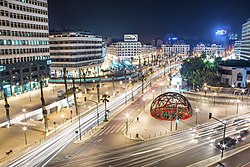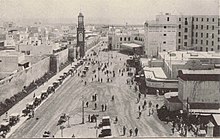United Nations Square (Casablanca)
| United Nations Square | |
|---|---|
| ساحة الأمم المتحدة | |
 United Nations Square at night. | |
 | |
| Coordinates | 33°35′42″N 7°37′08″W / 33.5949°N 7.6188°WCoordinates: 33°35′42″N 7°37′08″W / 33.5949°N 7.6188°W |
| Designer | Henri Prost |
| Connecting transport | Tramway T1 |
United Nations Square (Arabic: ساحة الأمم المتحدة, French: Place des Nations-Unies) is a public square in the center of Casablanca, Morocco. It has been central in the history of Casablanca.
History[]



The area outside the walls of the that is now United Nations Square, used to be the location of the Souq Kbir (سوق كبير), also referred to as le Grand Socco, before French colonization. In 1908, after the French bombardment and invasion of Casablanca, the French commander ordered the construction of a clock tower in the area, which then took the name, Place de l'Horloge, "Square of the Clock". The square was then named Place de France, "Square of France," and the surrounding area was developed by a team of French architects and urban planners chosen by the French Résident général Hubert Lyautey and led by Henri Prost.
The Magasins Paris-Maroc building (1914), constructed by and Auguste Perret, was located at the southern end of Place de France.[1][2] The Neo-Mauresque , which remains today, was built in 1916.[3]
As the European ville nouvelle, or "new city," expended eastward of the square, the square evolved from a marketplace to a contact point between the European city and the Casablanca , which French colonists described as the "ville indigène."[4]

The clock tower was demolished in 1948, and the square became a bus station for a period of time in the midcentury. A clock tower imitating the original's design was constructed a short distance closer to the medina in 1993.
The architect Jean-François Zevaco designed the Kora Ardia (كرة أرضية), "Globe," in 1975.[5]
The Casablanca Tramway transformed the square. Work started in 2009, and the first line was inaugurated December 12, 2012.[6]
Access[]
The square is reachable by Line 1 of the Tramway, which stops at United Nations Square Station.
See also[]
References[]
- ^ Cohen, Jean-Louis (Jan 21, 2020). "Elie Azagury (1918-2009) - le doyen des architectes Marocains".
- ^ "Archiwebture — Image en grand format". archiwebture.citedelarchitecture.fr. Retrieved 2020-05-05.
- ^ أرحال, سناء. "هذا تاريخ مجسم "الكرة الأرضية" وهذه خصائص إعادة تأهيله". مشاهد 24 (in Arabic). Retrieved 2019-05-14.
- ^ Cohen, Jean-Louis, 1949- (1998). Casablanca : mythes et figures d'une aventure urbaine. Eleb, Monique, 1945- ... [Paris]: Hazan. ISBN 2850256242. OCLC 406294705.CS1 maint: multiple names: authors list (link)
- ^ "Casablanca: la Kora Ardia en plein relooking". Al HuffPost Maghreb (in French). 2017-04-14. Retrieved 2019-05-14.
- ^ "Inauguration of Casablanca's first tram line in Morocco". Intelligent Transport. Retrieved 2019-05-14.
- Casablanca
- Squares in Morocco

